Unit 2 How often do you exercise? 知识清单+练习(含解析)
文档属性
| 名称 | Unit 2 How often do you exercise? 知识清单+练习(含解析) | 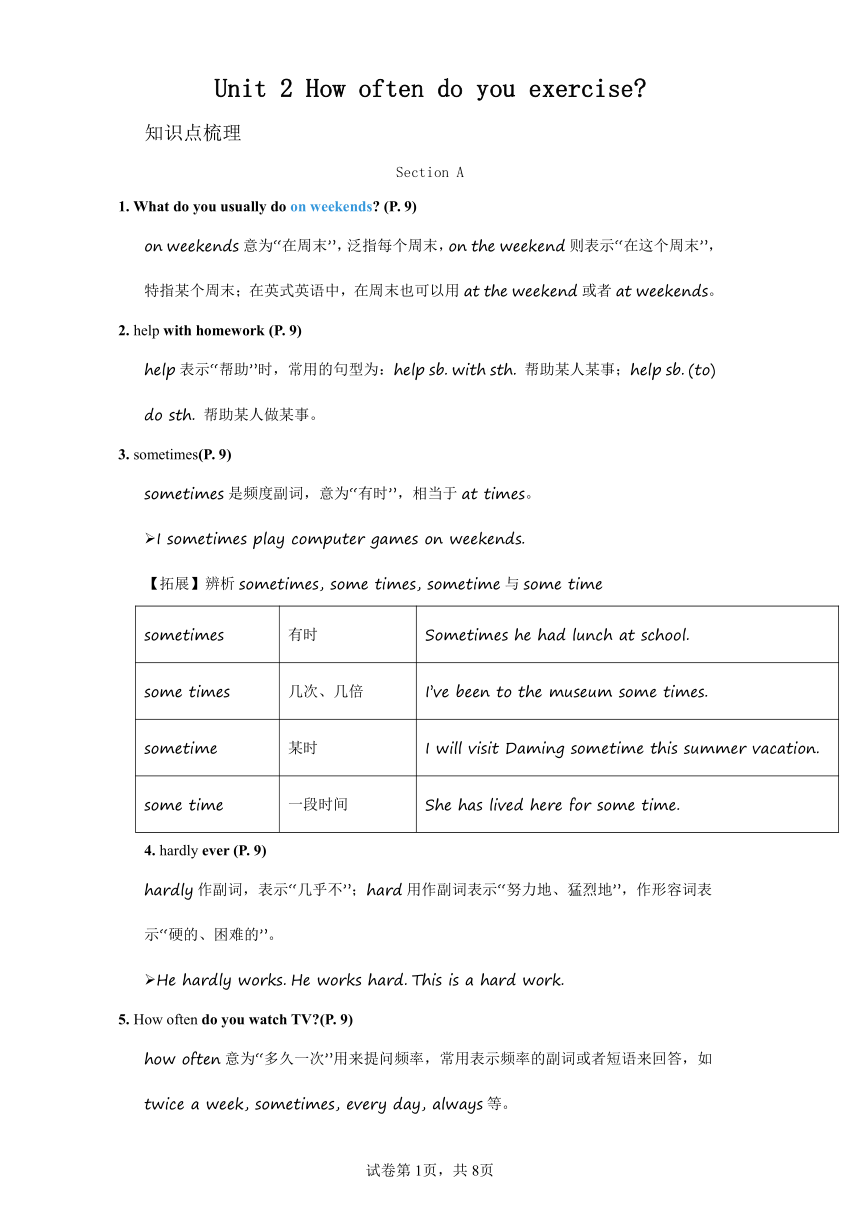 | |
| 格式 | docx | ||
| 文件大小 | 30.8KB | ||
| 资源类型 | 教案 | ||
| 版本资源 | 人教新目标(Go for it)版 | ||
| 科目 | 英语 | ||
| 更新时间 | 2023-11-26 13:05:17 | ||
图片预览

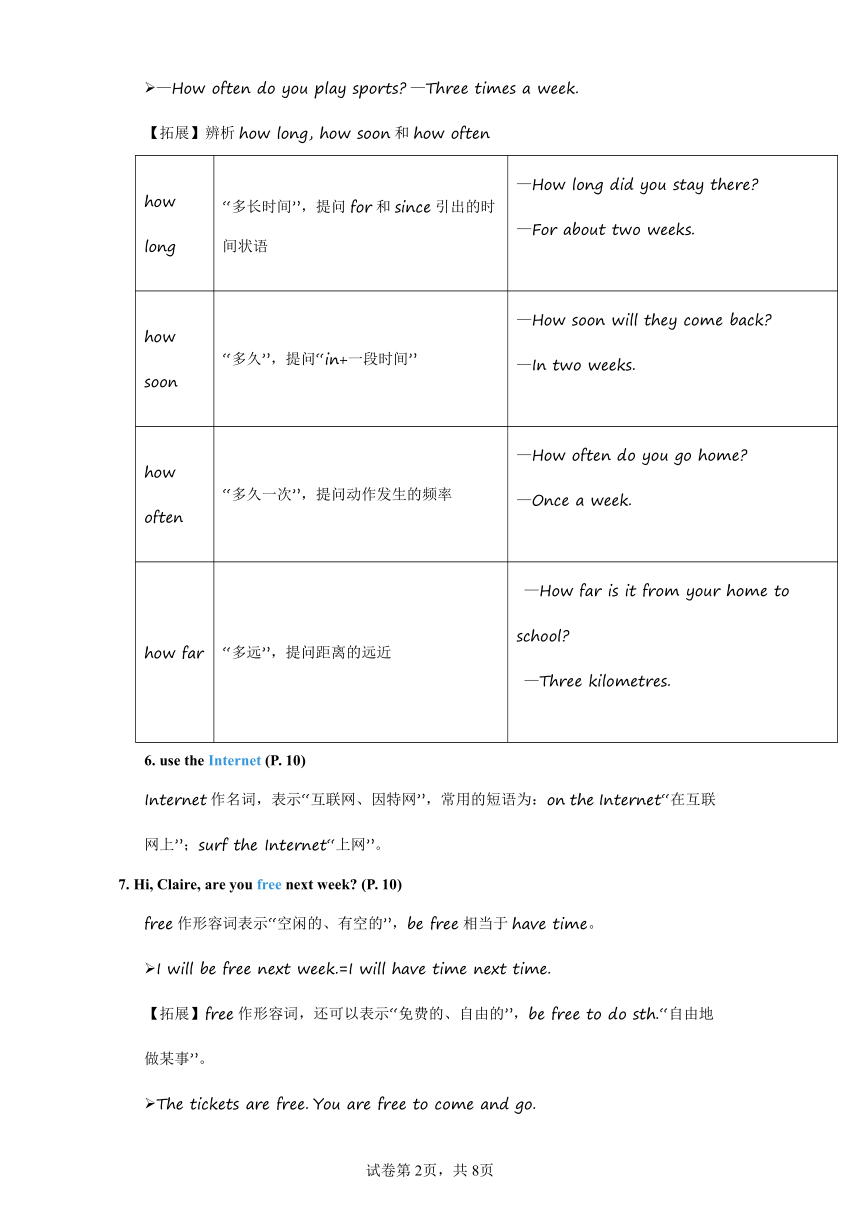
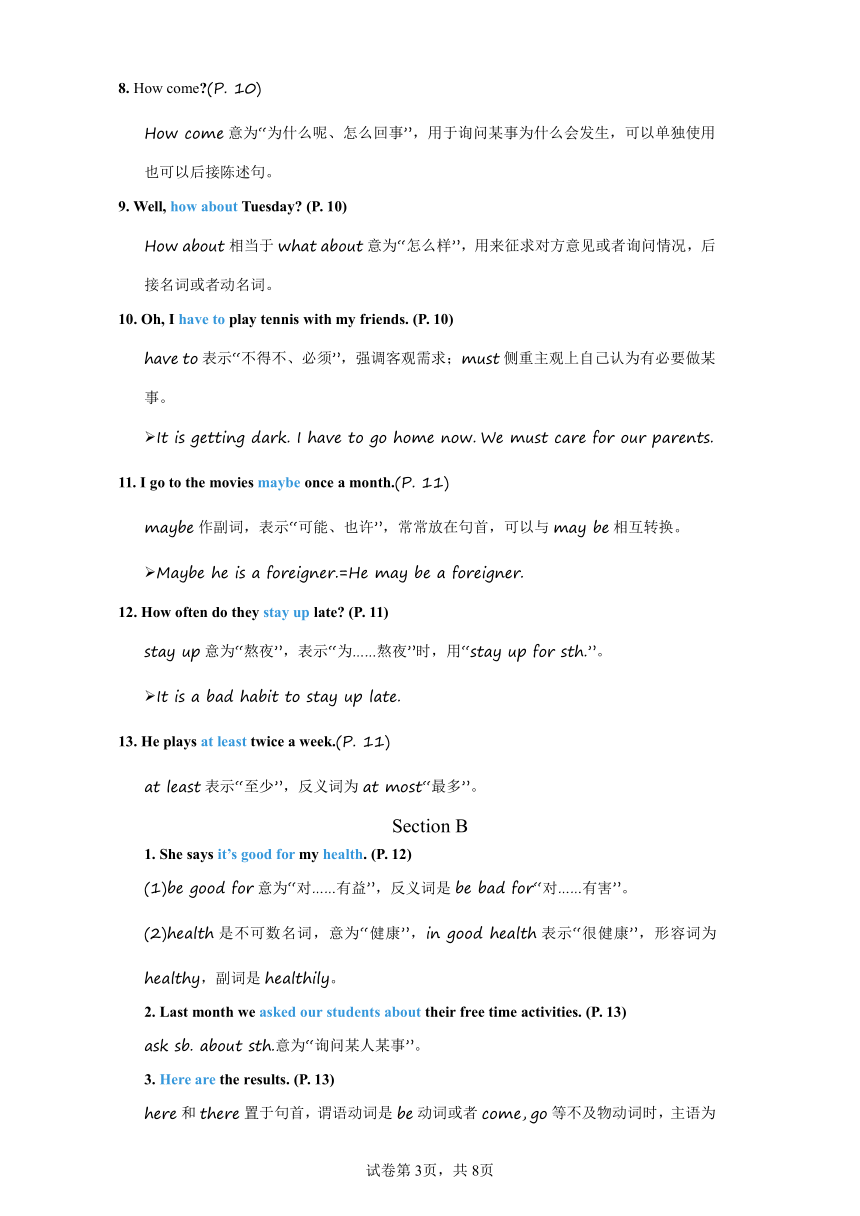
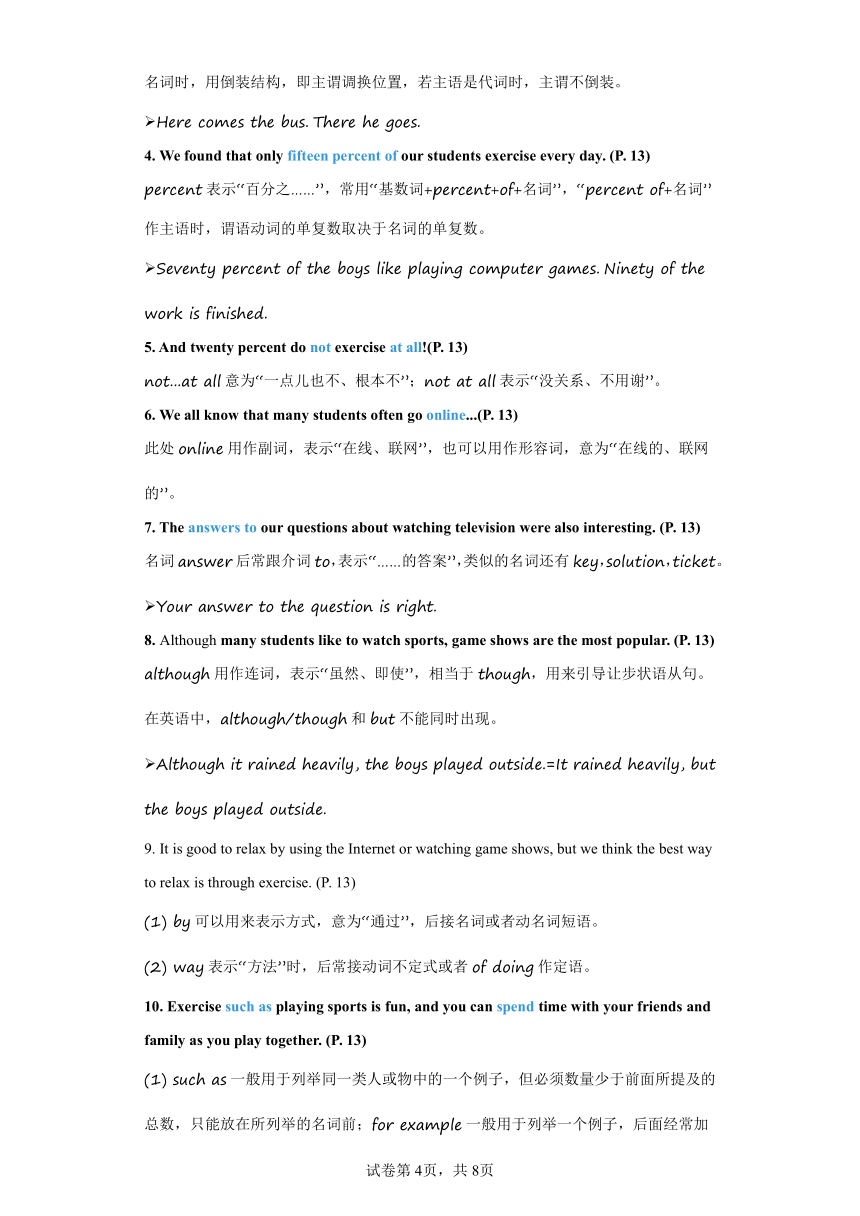
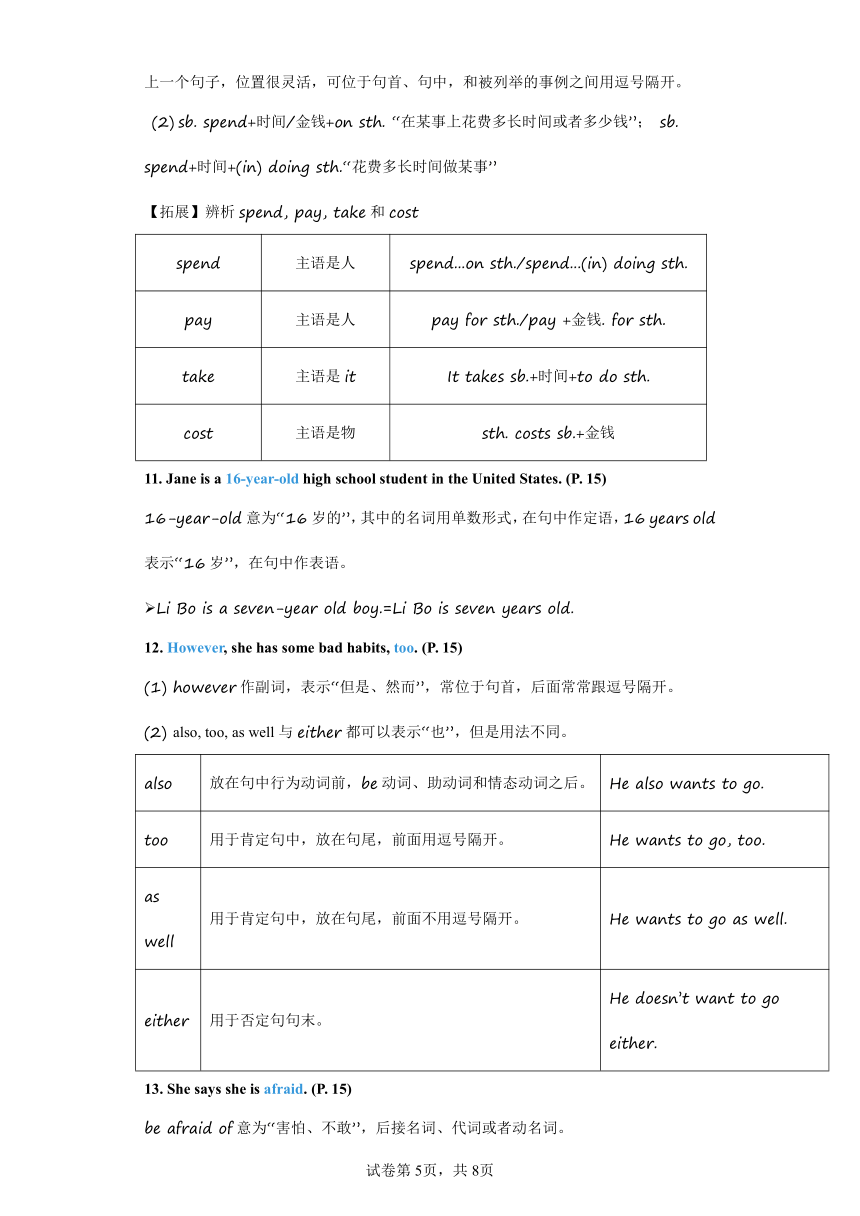
文档简介
Unit 2 How often do you exercise
知识点梳理
Section A
1. What do you usually do on weekends (P. 9)
on weekends意为“在周末”,泛指每个周末,on the weekend则表示“在这个周末”,特指某个周末;在英式英语中,在周末也可以用at the weekend或者at weekends。
2. help with homework (P. 9)
help表示“帮助”时,常用的句型为:help sb. with sth. 帮助某人某事;help sb. (to) do sth. 帮助某人做某事。
3. sometimes(P. 9)
sometimes是频度副词,意为“有时”,相当于at times。
I sometimes play computer games on weekends.
【拓展】辨析sometimes, some times, sometime与some time
sometimes 有时 Sometimes he had lunch at school.
some times 几次、几倍 I’ve been to the museum some times.
sometime 某时 I will visit Daming sometime this summer vacation.
some time 一段时间 She has lived here for some time.
4. hardly ever (P. 9)
hardly作副词,表示“几乎不”;hard用作副词表示“努力地、猛烈地”,作形容词表示“硬的、困难的”。
He hardly works. He works hard. This is a hard work.
5. How often do you watch TV (P. 9)
how often意为“多久一次”用来提问频率,常用表示频率的副词或者短语来回答,如twice a week, sometimes, every day, always等。
—How often do you play sports —Three times a week.
【拓展】辨析how long, how soon和how often
how long “多长时间”,提问for和since引出的时间状语 —How long did you stay there —For about two weeks.
how soon “多久”,提问“in+一段时间” —How soon will they come back —In two weeks.
how often “多久一次”,提问动作发生的频率 —How often do you go home —Once a week.
how far “多远”,提问距离的远近 —How far is it from your home to school —Three kilometres.
6. use the Internet (P. 10)
Internet作名词,表示“互联网、因特网”,常用的短语为:on the Internet“在互联网上”;surf the Internet“上网”。
7. Hi, Claire, are you free next week (P. 10)
free作形容词表示“空闲的、有空的”,be free相当于have time。
I will be free next week.=I will have time next time.
【拓展】free作形容词,还可以表示“免费的、自由的”,be free to do sth.“自由地做某事”。
The tickets are free. You are free to come and go.
8. How come (P. 10)
How come意为“为什么呢、怎么回事”,用于询问某事为什么会发生,可以单独使用也可以后接陈述句。
9. Well, how about Tuesday (P. 10)
How about相当于what about意为“怎么样”,用来征求对方意见或者询问情况,后接名词或者动名词。
10. Oh, I have to play tennis with my friends. (P. 10)
have to表示“不得不、必须”,强调客观需求;must侧重主观上自己认为有必要做某事。
It is getting dark. I have to go home now. We must care for our parents.
11. I go to the movies maybe once a month.(P. 11)
maybe作副词,表示“可能、也许”,常常放在句首,可以与may be相互转换。
Maybe he is a foreigner.=He may be a foreigner.
12. How often do they stay up late (P. 11)
stay up意为“熬夜”,表示“为……熬夜”时,用“stay up for sth.”。
It is a bad habit to stay up late.
13. He plays at least twice a week.(P. 11)
at least表示“至少”,反义词为at most“最多”。
Section B
1. She says it’s good for my health. (P. 12)
(1)be good for意为“对……有益”,反义词是be bad for“对……有害”。
(2)health是不可数名词,意为“健康”,in good health表示“很健康”,形容词为healthy,副词是healthily。
2. Last month we asked our students about their free time activities. (P. 13)
ask sb. about sth.意为“询问某人某事”。
3. Here are the results. (P. 13)
here和there置于句首,谓语动词是be动词或者come, go等不及物动词时,主语为名词时,用倒装结构,即主谓调换位置,若主语是代词时,主谓不倒装。
Here comes the bus. There he goes.
4. We found that only fifteen percent of our students exercise every day. (P. 13)
percent表示“百分之……”,常用“基数词+percent+of+名词”,“percent of+名词”作主语时,谓语动词的单复数取决于名词的单复数。
Seventy percent of the boys like playing computer games. Ninety of the work is finished.
5. And twenty percent do not exercise at all!(P. 13)
not...at all意为“一点儿也不、根本不”;not at all表示“没关系、不用谢”。
6. We all know that many students often go online...(P. 13)
此处online用作副词,表示“在线、联网”,也可以用作形容词,意为“在线的、联网的”。
7. The answers to our questions about watching television were also interesting. (P. 13)
名词answer后常跟介词to,表示“……的答案”,类似的名词还有key,solution,ticket。
Your answer to the question is right.
8. Although many students like to watch sports, game shows are the most popular. (P. 13)
although用作连词,表示“虽然、即使”,相当于though,用来引导让步状语从句。在英语中,although/though和but不能同时出现。
Although it rained heavily, the boys played outside.=It rained heavily, but the boys played outside.
9. It is good to relax by using the Internet or watching game shows, but we think the best way to relax is through exercise. (P. 13)
(1) by可以用来表示方式,意为“通过”,后接名词或者动名词短语。
(2) way表示“方法”时,后常接动词不定式或者of doing作定语。
10. Exercise such as playing sports is fun, and you can spend time with your friends and family as you play together. (P. 13)
(1) such as一般用于列举同一类人或物中的一个例子,但必须数量少于前面所提及的总数,只能放在所列举的名词前;for example一般用于列举一个例子,后面经常加上一个句子,位置很灵活,可位于句首、句中,和被列举的事例之间用逗号隔开。
(2) sb. spend+时间/金钱+on sth. “在某事上花费多长时间或者多少钱”; sb. spend+时间+(in) doing sth.“花费多长时间做某事”
【拓展】辨析spend, pay, take和cost
spend 主语是人 spend...on sth./spend...(in) doing sth.
pay 主语是人 pay for sth./pay +金钱. for sth.
take 主语是it It takes sb.+时间+to do sth.
cost 主语是物 sth. costs sb.+金钱
11. Jane is a 16-year-old high school student in the United States. (P. 15)
16-year-old意为“16岁的”,其中的名词用单数形式,在句中作定语,16 years old表示“16岁”,在句中作表语。
Li Bo is a seven-year old boy.=Li Bo is seven years old.
12. However, she has some bad habits, too. (P. 15)
(1) however作副词,表示“但是、然而”,常位于句首,后面常常跟逗号隔开。
(2) also, too, as well与either都可以表示“也”,但是用法不同。
also 放在句中行为动词前,be动词、助动词和情态动词之后。 He also wants to go.
too 用于肯定句中,放在句尾,前面用逗号隔开。 He wants to go, too.
as well 用于肯定句中,放在句尾,前面不用逗号隔开。 He wants to go as well.
either 用于否定句句末。 He doesn’t want to go either.
13. She says she is afraid. (P. 15)
be afraid of意为“害怕、不敢”,后接名词、代词或者动名词。
She is afraid of snakes. I was afraid of going through the woods.
[拓展]
1.be afraid to do sth. 意为“胆小不敢做某事”。He was afraid to go out at night.
2.be afraid that...意为“担心、害怕”。He was afraid that he would lose.
3.I’m afraid表示“恐怕”。
—Can we go there on time —I am afraid not.
知识点演练
1.—How often do you watch TV
—________.
A.Every day B.For two hours C.On Sunday D.Twice
2.My sister does morning exercises and that makes her ________.
A.health B.healthy C.healthily D.unhealthy
3.—________ will the coming winter holiday last in your city
—From January 28th to February 26th.
A.How often B.How soon C.How long D.How many
4.Little Tony was happy to get a gift from his friend, ________ the gift was only a card.
A.although B.but C.however D.if
5.—How was your vacation, Tina
—Fantastic. _______ it rained a lot, _____ we enjoyed ourselves.
A.Although; but B.But; / C.Although; / D.Because; so
6.Steven _________ checks his bag before he goes to bed, so he ________ forgets his homework.
A.sometimes; always B.always; seldom
C.never; seldom D.usually; often
7.—The air pollution(污染) is a serious problem in China.
—I agree. If there are________ people driving, there will be ________ pollution.
A.fewer, fewer B.less, less C.less, fewer D.fewer, less
8.They had to walk ________ a forest after they swam ________ the river.
A.through; cross B.across; through C.through; across D.across; across
9.________ they like shopping. We ________ take them to the shopping mall.
A.Maybe; may B.May; maybe C.May be; may D.Maybe; may be
10.________ of the students ________ girls in our class.
A.Twenty percents; is B.Twenty percents; are
C.Twenty percent; is D.Twenty percent; are
11.You can find some information on the (网络).
12.Tom n goes to school late. He is on time every day.
13.M it’s a good idea to go to the park tomorrow.
14.The study says that 14 p (百分比)of Chinese adults don’t exercise enough.
15.My sister can speak some languages, English, Spanish and Japanese.
16.Playing computer games for too long is bad for our (healthy).
17.Bill doesn’t like swimming, so he (hard) ever goes swimming.
18.My doctor advised me to take the medicine (药) (two) a day, in the morning and evening.
19.Both of them scored at (little) 10 points for their class in this year’s sports meeting.
20.The fish has been (die) for nearly two hours.
试卷第2页,共2页
试卷第1页,共1页
参考答案:
1.A
【详解】句意:——你多久看一次电视?——每天。
考查特殊疑问句。Every day 每天,回答“频度”;For two hours二小时,回答“时长”;On Sunday在周日,回答“什么时候”;Twice二次,回答“次数”;根据“How often”可知此处问“看电视的频度”。故选A。
2.B
【详解】句意:我妹妹做早操,这使她健康。
考查词义辨析。health健康,名词;healthy健康的,形容词;healthily健康地,副词;unhealthy不健康的,形容词。make sb+形容词,表示“使某人……”,形容词作宾补,根据“My sister does morning exercises and that makes her”及常识可知,锻炼让人们健康,故选B。
3.C
【详解】句意:——你所在城市即将到来的寒假会持续多久?——从1月28日到2月26日。
考查特殊疑问句。How often多久一次;How soon多快;How long多长时间;How many多少。根据“From January 28th to February 26th.”可知,此处是对时间段进行提问,应用“How long”。故选C。
4.A
【详解】句意:小托尼收到来自他朋友的礼物很高兴,尽管那个礼物仅仅是一张卡片。
考查连词辨析。although尽管;but但是;however不管怎样;if 如果。根据“Little Tony was happy to get a gift from his friend,”和“the gift was only a card.”可知,这里是although“尽管”引导的让步状语从句,表示小托尼收到来自他朋友的礼物很高兴,“尽管”那个礼物仅仅是一张卡片。故选A。
5.C
【详解】句意:——Tina,你的假期怎么样?——太棒了。尽管经常下雨,但我们玩得很开心。
考查连词辨析。although虽然,尽管,引导让步状语从句,不与but连用;but但是,表转折;because因为,引导原因状语从句,不与so连用;so所以,因此,引导结果状语从句。该句为让步状语从句,although和but不连用。故选C。
6.B
【详解】句意:史蒂文总是在睡觉前检查他的包,所以他很少忘记他的家庭作业。
考查频度副词。sometimes有时;always总是;seldom很少;never从不;usually通常;often经常。根据“Steven …checks his bag before be goes to bed, so he …forgets his homework.”可知,睡觉前检查他的包是一种习惯性的动作,这个习惯产生的结果就是很少会忘记作业。故选B。
7.D
【详解】句意:——空气污染在中国是一个严重的问题。——我同意。如果有更少的人开车,就会有更少的污染。
考查形容词比较级用法。fewer更少的,修饰可数名词;less更少的,修饰不可数名词。“people”是可数名词,用“fewer”修饰;“pollution”是不可数名词,用“less”修饰。故选D。
8.C
【详解】句意:他们游过河后不得不穿过一片森林。
考查介词辨析。through介词,内部穿过;cross动词,表面穿过;across介词,表面穿过。此句是连词“after”连接的两个句子,句中均有谓语动词“walk”和“swam”,空处只能填介词。穿过森林,从内部穿过,用through;游泳过河,从表面穿过,用across。故选C。
9.A
【详解】句意:也许他们喜欢购物。我们可以带他们去购物中心。
考查情态动词及副词。maybe“或许;大概”,副词,常位于句首,表示不确定性;may“也许;可能”,情态动词,后接动词原形;may be“可能是”,其中may是情态动词,be是动词原形,二者构成完整的谓语结构。根据句子结构可知,第一空应用maybe作状语,第二空应用may为情态动词,后跟动词原形take。故选A。
10.D
【详解】句意:我们班百分之二十的学生是女生。
考查主谓一致。percent百分之,百分数的表达常用“基数词+percent”表达,其中percent用单数形式,排除A和B,主语的中心词students是复数,所以用be动词的复数are,排除C,故选D。
11.Internet
【详解】句意:你可以在网上找到一些信息。“网络”Internet。故填Internet。
12.(n)ever
【详解】句意:汤姆上学从不迟到。他每天都很准时。根据“He is on time every day.”及首字母可知,都是按时到校,所以从不上学迟到,never“从不”,故填(n)ever。
13.(M)aybe
【详解】句意:明天去公园可能是一个好主意。空格后是一个完整的句子,故空格处应填副词修饰整个句子。根据句意和首字母M,maybe“可能”符合语境。故填(M)aybe。
14.(p)ercent
【详解】句意:研究表明,14%的中国成年人锻炼不够。percent“百分比”,通常用单数形式表示“百分之……”,故填(p)ercent。
15.such as
【详解】句意:我姐姐会说一些语言,如英语、西班牙语和日语。根据“English, Spanish and Japanese”可知,此处表示列举,且对象不止一个,应用such as“例如”。故填such as。
16.health
【详解】句意:长时间玩电脑游戏对我们的健康有害。根据“our”可知,此处要用healthy的名词health“健康”,故填health。
17.hardly
【详解】句意:比尔不喜欢游泳,因此他从不去游泳。
考查词性转换。根据“Bill doesn’t like swimming”和提示单词“hard”可知,他不喜欢游泳所以几乎没有去过,hardly“几乎不”符合题意,故填hardly。
18.twice
【详解】句意:我的医生建议我每天吃两次药,早晚各一次。根据“My doctor advised me to take the medicine...a day, in the morning and evening.”可知,此处是twice a day短语,意为“一天两次”,故填twice。
19.least
【详解】句意:在年度体育大赛中,他们俩为他们班都至少拿了10分。at least“至少”,固定搭配;least“最少”,little的最高级形式。故填least。
20.dead
【详解】句意:这条鱼已经死了将近两个小时了。die“死亡”,是一个动词。根据空前系动词“been”和句中的“for nearly two hours”可知,这里应填形容词dead“死亡的”,表示状态。故填dead。
答案第1页,共2页
答案第1页,共2页
知识点梳理
Section A
1. What do you usually do on weekends (P. 9)
on weekends意为“在周末”,泛指每个周末,on the weekend则表示“在这个周末”,特指某个周末;在英式英语中,在周末也可以用at the weekend或者at weekends。
2. help with homework (P. 9)
help表示“帮助”时,常用的句型为:help sb. with sth. 帮助某人某事;help sb. (to) do sth. 帮助某人做某事。
3. sometimes(P. 9)
sometimes是频度副词,意为“有时”,相当于at times。
I sometimes play computer games on weekends.
【拓展】辨析sometimes, some times, sometime与some time
sometimes 有时 Sometimes he had lunch at school.
some times 几次、几倍 I’ve been to the museum some times.
sometime 某时 I will visit Daming sometime this summer vacation.
some time 一段时间 She has lived here for some time.
4. hardly ever (P. 9)
hardly作副词,表示“几乎不”;hard用作副词表示“努力地、猛烈地”,作形容词表示“硬的、困难的”。
He hardly works. He works hard. This is a hard work.
5. How often do you watch TV (P. 9)
how often意为“多久一次”用来提问频率,常用表示频率的副词或者短语来回答,如twice a week, sometimes, every day, always等。
—How often do you play sports —Three times a week.
【拓展】辨析how long, how soon和how often
how long “多长时间”,提问for和since引出的时间状语 —How long did you stay there —For about two weeks.
how soon “多久”,提问“in+一段时间” —How soon will they come back —In two weeks.
how often “多久一次”,提问动作发生的频率 —How often do you go home —Once a week.
how far “多远”,提问距离的远近 —How far is it from your home to school —Three kilometres.
6. use the Internet (P. 10)
Internet作名词,表示“互联网、因特网”,常用的短语为:on the Internet“在互联网上”;surf the Internet“上网”。
7. Hi, Claire, are you free next week (P. 10)
free作形容词表示“空闲的、有空的”,be free相当于have time。
I will be free next week.=I will have time next time.
【拓展】free作形容词,还可以表示“免费的、自由的”,be free to do sth.“自由地做某事”。
The tickets are free. You are free to come and go.
8. How come (P. 10)
How come意为“为什么呢、怎么回事”,用于询问某事为什么会发生,可以单独使用也可以后接陈述句。
9. Well, how about Tuesday (P. 10)
How about相当于what about意为“怎么样”,用来征求对方意见或者询问情况,后接名词或者动名词。
10. Oh, I have to play tennis with my friends. (P. 10)
have to表示“不得不、必须”,强调客观需求;must侧重主观上自己认为有必要做某事。
It is getting dark. I have to go home now. We must care for our parents.
11. I go to the movies maybe once a month.(P. 11)
maybe作副词,表示“可能、也许”,常常放在句首,可以与may be相互转换。
Maybe he is a foreigner.=He may be a foreigner.
12. How often do they stay up late (P. 11)
stay up意为“熬夜”,表示“为……熬夜”时,用“stay up for sth.”。
It is a bad habit to stay up late.
13. He plays at least twice a week.(P. 11)
at least表示“至少”,反义词为at most“最多”。
Section B
1. She says it’s good for my health. (P. 12)
(1)be good for意为“对……有益”,反义词是be bad for“对……有害”。
(2)health是不可数名词,意为“健康”,in good health表示“很健康”,形容词为healthy,副词是healthily。
2. Last month we asked our students about their free time activities. (P. 13)
ask sb. about sth.意为“询问某人某事”。
3. Here are the results. (P. 13)
here和there置于句首,谓语动词是be动词或者come, go等不及物动词时,主语为名词时,用倒装结构,即主谓调换位置,若主语是代词时,主谓不倒装。
Here comes the bus. There he goes.
4. We found that only fifteen percent of our students exercise every day. (P. 13)
percent表示“百分之……”,常用“基数词+percent+of+名词”,“percent of+名词”作主语时,谓语动词的单复数取决于名词的单复数。
Seventy percent of the boys like playing computer games. Ninety of the work is finished.
5. And twenty percent do not exercise at all!(P. 13)
not...at all意为“一点儿也不、根本不”;not at all表示“没关系、不用谢”。
6. We all know that many students often go online...(P. 13)
此处online用作副词,表示“在线、联网”,也可以用作形容词,意为“在线的、联网的”。
7. The answers to our questions about watching television were also interesting. (P. 13)
名词answer后常跟介词to,表示“……的答案”,类似的名词还有key,solution,ticket。
Your answer to the question is right.
8. Although many students like to watch sports, game shows are the most popular. (P. 13)
although用作连词,表示“虽然、即使”,相当于though,用来引导让步状语从句。在英语中,although/though和but不能同时出现。
Although it rained heavily, the boys played outside.=It rained heavily, but the boys played outside.
9. It is good to relax by using the Internet or watching game shows, but we think the best way to relax is through exercise. (P. 13)
(1) by可以用来表示方式,意为“通过”,后接名词或者动名词短语。
(2) way表示“方法”时,后常接动词不定式或者of doing作定语。
10. Exercise such as playing sports is fun, and you can spend time with your friends and family as you play together. (P. 13)
(1) such as一般用于列举同一类人或物中的一个例子,但必须数量少于前面所提及的总数,只能放在所列举的名词前;for example一般用于列举一个例子,后面经常加上一个句子,位置很灵活,可位于句首、句中,和被列举的事例之间用逗号隔开。
(2) sb. spend+时间/金钱+on sth. “在某事上花费多长时间或者多少钱”; sb. spend+时间+(in) doing sth.“花费多长时间做某事”
【拓展】辨析spend, pay, take和cost
spend 主语是人 spend...on sth./spend...(in) doing sth.
pay 主语是人 pay for sth./pay +金钱. for sth.
take 主语是it It takes sb.+时间+to do sth.
cost 主语是物 sth. costs sb.+金钱
11. Jane is a 16-year-old high school student in the United States. (P. 15)
16-year-old意为“16岁的”,其中的名词用单数形式,在句中作定语,16 years old表示“16岁”,在句中作表语。
Li Bo is a seven-year old boy.=Li Bo is seven years old.
12. However, she has some bad habits, too. (P. 15)
(1) however作副词,表示“但是、然而”,常位于句首,后面常常跟逗号隔开。
(2) also, too, as well与either都可以表示“也”,但是用法不同。
also 放在句中行为动词前,be动词、助动词和情态动词之后。 He also wants to go.
too 用于肯定句中,放在句尾,前面用逗号隔开。 He wants to go, too.
as well 用于肯定句中,放在句尾,前面不用逗号隔开。 He wants to go as well.
either 用于否定句句末。 He doesn’t want to go either.
13. She says she is afraid. (P. 15)
be afraid of意为“害怕、不敢”,后接名词、代词或者动名词。
She is afraid of snakes. I was afraid of going through the woods.
[拓展]
1.be afraid to do sth. 意为“胆小不敢做某事”。He was afraid to go out at night.
2.be afraid that...意为“担心、害怕”。He was afraid that he would lose.
3.I’m afraid表示“恐怕”。
—Can we go there on time —I am afraid not.
知识点演练
1.—How often do you watch TV
—________.
A.Every day B.For two hours C.On Sunday D.Twice
2.My sister does morning exercises and that makes her ________.
A.health B.healthy C.healthily D.unhealthy
3.—________ will the coming winter holiday last in your city
—From January 28th to February 26th.
A.How often B.How soon C.How long D.How many
4.Little Tony was happy to get a gift from his friend, ________ the gift was only a card.
A.although B.but C.however D.if
5.—How was your vacation, Tina
—Fantastic. _______ it rained a lot, _____ we enjoyed ourselves.
A.Although; but B.But; / C.Although; / D.Because; so
6.Steven _________ checks his bag before he goes to bed, so he ________ forgets his homework.
A.sometimes; always B.always; seldom
C.never; seldom D.usually; often
7.—The air pollution(污染) is a serious problem in China.
—I agree. If there are________ people driving, there will be ________ pollution.
A.fewer, fewer B.less, less C.less, fewer D.fewer, less
8.They had to walk ________ a forest after they swam ________ the river.
A.through; cross B.across; through C.through; across D.across; across
9.________ they like shopping. We ________ take them to the shopping mall.
A.Maybe; may B.May; maybe C.May be; may D.Maybe; may be
10.________ of the students ________ girls in our class.
A.Twenty percents; is B.Twenty percents; are
C.Twenty percent; is D.Twenty percent; are
11.You can find some information on the (网络).
12.Tom n goes to school late. He is on time every day.
13.M it’s a good idea to go to the park tomorrow.
14.The study says that 14 p (百分比)of Chinese adults don’t exercise enough.
15.My sister can speak some languages, English, Spanish and Japanese.
16.Playing computer games for too long is bad for our (healthy).
17.Bill doesn’t like swimming, so he (hard) ever goes swimming.
18.My doctor advised me to take the medicine (药) (two) a day, in the morning and evening.
19.Both of them scored at (little) 10 points for their class in this year’s sports meeting.
20.The fish has been (die) for nearly two hours.
试卷第2页,共2页
试卷第1页,共1页
参考答案:
1.A
【详解】句意:——你多久看一次电视?——每天。
考查特殊疑问句。Every day 每天,回答“频度”;For two hours二小时,回答“时长”;On Sunday在周日,回答“什么时候”;Twice二次,回答“次数”;根据“How often”可知此处问“看电视的频度”。故选A。
2.B
【详解】句意:我妹妹做早操,这使她健康。
考查词义辨析。health健康,名词;healthy健康的,形容词;healthily健康地,副词;unhealthy不健康的,形容词。make sb+形容词,表示“使某人……”,形容词作宾补,根据“My sister does morning exercises and that makes her”及常识可知,锻炼让人们健康,故选B。
3.C
【详解】句意:——你所在城市即将到来的寒假会持续多久?——从1月28日到2月26日。
考查特殊疑问句。How often多久一次;How soon多快;How long多长时间;How many多少。根据“From January 28th to February 26th.”可知,此处是对时间段进行提问,应用“How long”。故选C。
4.A
【详解】句意:小托尼收到来自他朋友的礼物很高兴,尽管那个礼物仅仅是一张卡片。
考查连词辨析。although尽管;but但是;however不管怎样;if 如果。根据“Little Tony was happy to get a gift from his friend,”和“the gift was only a card.”可知,这里是although“尽管”引导的让步状语从句,表示小托尼收到来自他朋友的礼物很高兴,“尽管”那个礼物仅仅是一张卡片。故选A。
5.C
【详解】句意:——Tina,你的假期怎么样?——太棒了。尽管经常下雨,但我们玩得很开心。
考查连词辨析。although虽然,尽管,引导让步状语从句,不与but连用;but但是,表转折;because因为,引导原因状语从句,不与so连用;so所以,因此,引导结果状语从句。该句为让步状语从句,although和but不连用。故选C。
6.B
【详解】句意:史蒂文总是在睡觉前检查他的包,所以他很少忘记他的家庭作业。
考查频度副词。sometimes有时;always总是;seldom很少;never从不;usually通常;often经常。根据“Steven …checks his bag before be goes to bed, so he …forgets his homework.”可知,睡觉前检查他的包是一种习惯性的动作,这个习惯产生的结果就是很少会忘记作业。故选B。
7.D
【详解】句意:——空气污染在中国是一个严重的问题。——我同意。如果有更少的人开车,就会有更少的污染。
考查形容词比较级用法。fewer更少的,修饰可数名词;less更少的,修饰不可数名词。“people”是可数名词,用“fewer”修饰;“pollution”是不可数名词,用“less”修饰。故选D。
8.C
【详解】句意:他们游过河后不得不穿过一片森林。
考查介词辨析。through介词,内部穿过;cross动词,表面穿过;across介词,表面穿过。此句是连词“after”连接的两个句子,句中均有谓语动词“walk”和“swam”,空处只能填介词。穿过森林,从内部穿过,用through;游泳过河,从表面穿过,用across。故选C。
9.A
【详解】句意:也许他们喜欢购物。我们可以带他们去购物中心。
考查情态动词及副词。maybe“或许;大概”,副词,常位于句首,表示不确定性;may“也许;可能”,情态动词,后接动词原形;may be“可能是”,其中may是情态动词,be是动词原形,二者构成完整的谓语结构。根据句子结构可知,第一空应用maybe作状语,第二空应用may为情态动词,后跟动词原形take。故选A。
10.D
【详解】句意:我们班百分之二十的学生是女生。
考查主谓一致。percent百分之,百分数的表达常用“基数词+percent”表达,其中percent用单数形式,排除A和B,主语的中心词students是复数,所以用be动词的复数are,排除C,故选D。
11.Internet
【详解】句意:你可以在网上找到一些信息。“网络”Internet。故填Internet。
12.(n)ever
【详解】句意:汤姆上学从不迟到。他每天都很准时。根据“He is on time every day.”及首字母可知,都是按时到校,所以从不上学迟到,never“从不”,故填(n)ever。
13.(M)aybe
【详解】句意:明天去公园可能是一个好主意。空格后是一个完整的句子,故空格处应填副词修饰整个句子。根据句意和首字母M,maybe“可能”符合语境。故填(M)aybe。
14.(p)ercent
【详解】句意:研究表明,14%的中国成年人锻炼不够。percent“百分比”,通常用单数形式表示“百分之……”,故填(p)ercent。
15.such as
【详解】句意:我姐姐会说一些语言,如英语、西班牙语和日语。根据“English, Spanish and Japanese”可知,此处表示列举,且对象不止一个,应用such as“例如”。故填such as。
16.health
【详解】句意:长时间玩电脑游戏对我们的健康有害。根据“our”可知,此处要用healthy的名词health“健康”,故填health。
17.hardly
【详解】句意:比尔不喜欢游泳,因此他从不去游泳。
考查词性转换。根据“Bill doesn’t like swimming”和提示单词“hard”可知,他不喜欢游泳所以几乎没有去过,hardly“几乎不”符合题意,故填hardly。
18.twice
【详解】句意:我的医生建议我每天吃两次药,早晚各一次。根据“My doctor advised me to take the medicine...a day, in the morning and evening.”可知,此处是twice a day短语,意为“一天两次”,故填twice。
19.least
【详解】句意:在年度体育大赛中,他们俩为他们班都至少拿了10分。at least“至少”,固定搭配;least“最少”,little的最高级形式。故填least。
20.dead
【详解】句意:这条鱼已经死了将近两个小时了。die“死亡”,是一个动词。根据空前系动词“been”和句中的“for nearly two hours”可知,这里应填形容词dead“死亡的”,表示状态。故填dead。
答案第1页,共2页
答案第1页,共2页
同课章节目录
- Unit 1 Where did you go on vacation?
- Section A
- Section B
- Unit 2 How often do you exercise?
- Section A
- Section B
- Unit 3 I'm more outgoing than my sister.
- Section A
- Section B
- Unit 4 What's the best movie theater?
- Section A
- Section B
- Unit 5 Do you want to watch a game show?
- Section A
- Section B
- Unit 6 I'm going to study computer science.
- Section A
- Section B
- Unit 7 Will people have robots?
- Section A
- Section B
- Unit 8 How do you make a banana milk shake?
- Section A
- Section B
- Unit 9 Can you come to my party?
- Section A
- Section B
- Unit 10 If you go to the party, you'll have a grea
- Section A
- Section B
